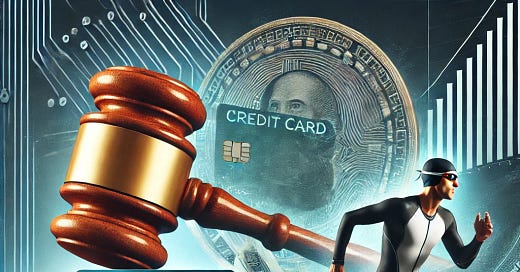Monday Links
Thoughts on changes in AML, redistribution in credit card rewards, EV sales, a stunning conclusion to the women’s junior world triathlons, and postpartum depression.
Here’s what I am reading and thinking about this week.
U.S. Anti-Money Laundering Laws Are Outdated. Regulators Are Struggling With How to Modernize Them, Dylan Tokar, Wall Street Journal, October 16, 2024.
I don’t know how much I agree with the characterization of this headline. Regulators at both FinCEN and the banking regulators have issued new regulations this year, admittedly four years after Congress passed a law instructing them to do so (here is a great overview from CRS on that law). I wouldn’t call it a “struggle.” Right on cue, the Bank Policy Institute wrote a harsh letter condemning the regulations as too expensive and in violation of the letter and spirit of the law. But banks really seem to resent on an existential basis the entire enterprise of AML, which requires banks to become the posse comitatus - Wyatt Earp style - of the US government in monitoring the financial activities of would-be bad guys. Returning to the pre-1970s version where every citizen is responsible for their own lawfulness is off the table. The question is how best to make the good guys pay to keep the bad guys out.
Who Pays For Your Rewards? Redistribution in the Credit Card Market, by Agarwal, Sumit, Andrea Presbitero, Andre F. Silva, and Carlo Wix, Board of Governors of the Federal Reserve System, 2023.
There has arisen a story - championed in part by my friend Aaron Klein at Brookings - that credit card rewards are a kind of “reverse Robin Hood,” in that the wealthy receive these amazing airline miles and cash back rewards because very poor people are locked into usurious interest rates. The poor pay for the the global 2% discount on all purchases by the wealthy.
I have never been persuaded by the facts of the case, for two reasons. First, the benefits of swiping for the card issuers are not simply born through the interest rates, which travels through a separate mechanism. Second, it just makes no sense: why would credit card issuers take these fat margins paid by poor people, look at their stakeholders, and decide their wealthy customers deserve freebies? I understand the rhetorical appeal, but not the actual analysis of the problem.
This paper presents another story. From the paper: “The combined results...show that, on average, high-income consumers with high FICO scores benefit from reward credit cards largely at the expense of high-income consumers with low FICO scores. Hence, our findings are not primarily driven by income and therefore inconsistent with a ‘reverse Robin Hood’ mechanism” (emphasis mine).
In other words, we have here a redistribution - such as there is - that regresses on financial sophistication, not socioeconomics. And because banks do not always anticipate changes in sophistication, the business model makes a lot more sense (and raises far fewer public policy concerns) than one about anti-poor animus.
She Had Thoughts of Harming Her Baby. To Treat Her, Doctors Kept Them Together. Chloe Shakin, New York Times, Oct 9, 2024
This is such a beautiful, painful story. After our first child was born, we went through a searing experience with postpartum depression. It changed us forever. The fact that as a society we still, in 2024, treat some instances of a clear and tragic medical issue in a register of criminal justice is such a barbaric relic based in old stereotypes that I wish had died with the Salem Witch Trials. I hope my children’s experience with this, should they encounter it, will be much different.
Lucid’s boss on sputtering EV market, Elon, and doing business in Saudi Arabia, Liz Hoffman, Semafor, October 17, 2024.
Lucid is one of the most exciting prospects in the EV market of late. But their moral authority as the principled alternative to Elon Musk is undermined in part because of its ownership through Saudi Arabia, with all the politics associated with it. It is also hard for consumers to make that bet when the company itself appears only to avoid bankruptcy because the Saudi government is so devoted to it.
Consumers interested in an alternative to Muskian antics but who don’t want to make the bet on Lucid essentially have the BMW i7 or the Porsche Taycan available to them. Great cars, they seem to me, but there is something about flying under the luxury radar that made Tesla exciting and draws in people for Lucids. This is a pretty critical time for the market.
Incredible teenage triathlon PHENOM beaten in EPIC World Championship finish, John Levison, Tri247, October 18, 2024.
This is an amazing moment at the junior worlds for triathletes. A 2 second finish after a stunning race from some of the most exciting athletes in the sport. I am still new to triathlons - 2025 is my year to break 3 hours in the Olympic triathlon, to attempt a half Ironman while maintaining a 1,000 lb powerlift - but races like this explain my love for the sport. A great powerlifter rallies that kind of focus for seconds at a time; triathletes sustain that focus for hours.





Looking at the credit card paper — they don’t seem to take into consideration pass through of the fees. Many vendors explicitly and all vendors implicitly pass on the 2.5-3.5% surcharge. The rewards cards only make nominal sense (as opposed I guess to cash?) if we ignore the extra cost for use. Does anyone talk through that nuance? I’m super curious.